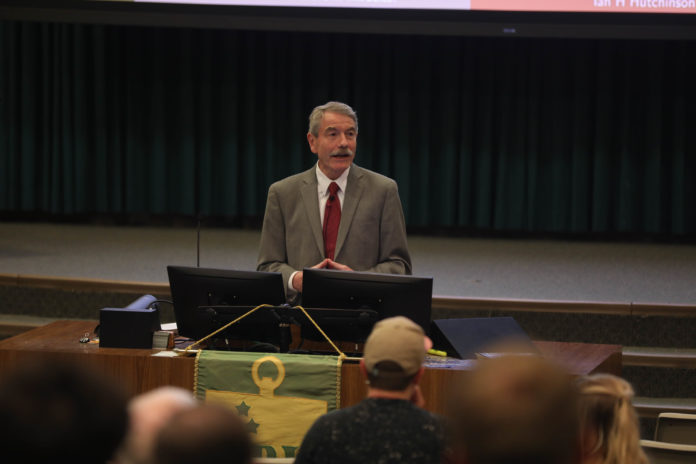
By Taylor Wolf | Social Media Editor
Dr. Ian Hutchinson, plasma physicist and renowned professor of nuclear science and engineering at M.I.T., explained that faith and science are in fact compatible and engaged during the 2019 Roy B. Albaugh Lecture Thursday in Bennett Auditorium.
Sponsored by the Baylor chapter of Phi Beta Kappa, Hutchinson’s talk was based upon his latest book that was published last year, “Can a Scientist Believe in Miracles? An MIT Professor Answers Questions on God and Science.”
Hutchinson has worked extensively on the philosophy of science and the relationship between science and religion and the book addresses over 200 questions that Hutchinson has been asked by university audiences in the last 25 years on all aspects of God and science.
According to InterVaristy Press, “In this comprehensive volume, Hutchinson answers a full range of inquiries with sound scientific insights and measured Christian perspective. Without minimizing challenging questions, he explores how science and Christianity are mutually supportive and intellectually consistent.”
Hutchinson explained that many people claim that miracles are impossible if you take modern science seriously, however, he believes this isn’t true.
Alan Lightman, a physicist colleague of Hutchinson, calls the central doctrine of science the view that the laws of nature are inviolable – “that science and God are compatible as long as the latter is content to stand on the sidelines once the universe has begun.”
Hutchison said that this deduction reflects the belief that it’s a requirement of science for the laws of the universe to be closed and impervious to any outside action, therefore, ruling out the ability for God to act in the world.
“The only form of God that could survive such a restriction is one that simply happened to set the universe going but is thereafter powerless to change anything in it and pretty much irrelevant,” Hutchinson said.
“The God that I believe in is active in history and the world today,” Hutchinson said. “The presumption that the laws of nature are inviolable are actually not a doctrine of science.”
Hutchinson argues that natural science works on the basis of reproducible experiments or observations, and this characteristic method cannot be applied to miracles because a miracle is by definition a unique event never to be reproduced – therefore, science is inherently incompetent to prove a miracle.
There are two types of miracles often distinguished, according to Hutchinson. “Law-breaking” miracles have no explanation consistent with the normal course of nature, such as turning water into wine. “Confluence-of-circumstances” miracles break no specific natural law but are highly unlikely as mere chance, such as Jesus’ prediction of Peter’s denial. Hutchinson explained that both types require interpretation.
It is a mistake to define miracles as a violation of the law of nature, Hutchinson said.
The foundation of belief in miracles, Hutchinson explained, is rooted in history, rather than science, and history is truth and knowledge we accept that is not acquired by the methods of science or reproducible in nature.
Additionally, Hutchinson explained that some of history’s greatest scientists were Christians who believed in miracles, namely Isaac Newton, Robert Boyle and John Dalton.
In response to skeptics who argue that in those times in history, they did not know the science today, Hutchinson said, “Science has labored for centuries to find the deterministic theories of nature. Not all the universe can be described that way… Much of the worlds events don’t yield to scientific explanation.”
For example, Hutchinson said that people knew blind people didn’t just regain their sight and dead people don’t just resurrect.
“Miracles function as special demonstrations of God’s power only because people knew [and know] they don’t normally happen,” Hutchinson said.
This was known then and is known now. Hutchinson said this undermines a skeptical view.
“We know the universe is unpredictable,” Hutchinson said. “What science knows today undermines a deterministic philosophy.”
In response to the argument that people of old didn’t understand nature and therefore everything seemed miraculous in the past, whereas now, we are better informed and shouldn’t believe in miracles Hutchinson offers an appeal to logic.
“This is untrue to history and to logic,” Hutchinson said.
Hutchinson said that miracles don’t defy science, but rather support its unpredictability and inexplicability. He believes it’s important for members of religious and science communities to engage in events and discussions such as this publicly open Roy B. Albaugh Lecture.
“I don’t just want to help the skeptic understand this relationship [between science and the Christian faith], but the Christian too,” Hutchinson said.
A deeper dive into the topic and more on the theological side can be found in Hutchinson’s latest book.





